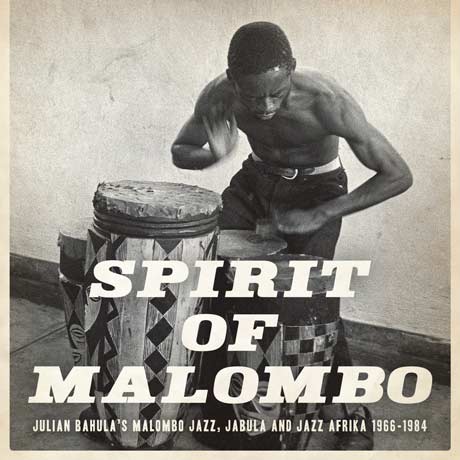Malombo music takes its name from the drums that are used in a South African rhythmic healing ritual to exorcise ancestral spirits thought to make a person sick. Spanning the years 1966-1984, the two-disc Spirit Of Malombo chronicles the music of drummer and anti-apartheid activist Julian Bahula and his use of malombo drums and rhythms, which brought about a distinctive African consciousness to the continent's progressive jazz scene.
The first disc charts the evolution of the music with the Malombo Jazzmen. Bahula's serpentine, indigenous polyrhythms form a bedrock for the sparse but supple flourishes of Lucky Ranku's tremolo guitar and Abbey Cindi's flute on "Abie's Mood" and "Malombo Workshop," creating a joyful fusion. The music takes a more expansive and political turn on the second disc, which features work recorded following Bahula's political exile in the UK and the formation of the group Jabula, which incorporated elements of funk, soul and American fusion. The rollicking "Thunder Into Our Hearts" bristles with a defiant energy, while the effervescent "Botlokwa" features several generations of exiled South African musicians in an infectious tribute to the early 19th Century Warrior Queen Manthatisi. Apartheid in South Africa may be history, but Spirit Of Malombo sounds as vital and timeless as ever. An extensive essay that tells Bahula's compelling musical odyssey rounds out this essential package.
(Strut)The first disc charts the evolution of the music with the Malombo Jazzmen. Bahula's serpentine, indigenous polyrhythms form a bedrock for the sparse but supple flourishes of Lucky Ranku's tremolo guitar and Abbey Cindi's flute on "Abie's Mood" and "Malombo Workshop," creating a joyful fusion. The music takes a more expansive and political turn on the second disc, which features work recorded following Bahula's political exile in the UK and the formation of the group Jabula, which incorporated elements of funk, soul and American fusion. The rollicking "Thunder Into Our Hearts" bristles with a defiant energy, while the effervescent "Botlokwa" features several generations of exiled South African musicians in an infectious tribute to the early 19th Century Warrior Queen Manthatisi. Apartheid in South Africa may be history, but Spirit Of Malombo sounds as vital and timeless as ever. An extensive essay that tells Bahula's compelling musical odyssey rounds out this essential package.
